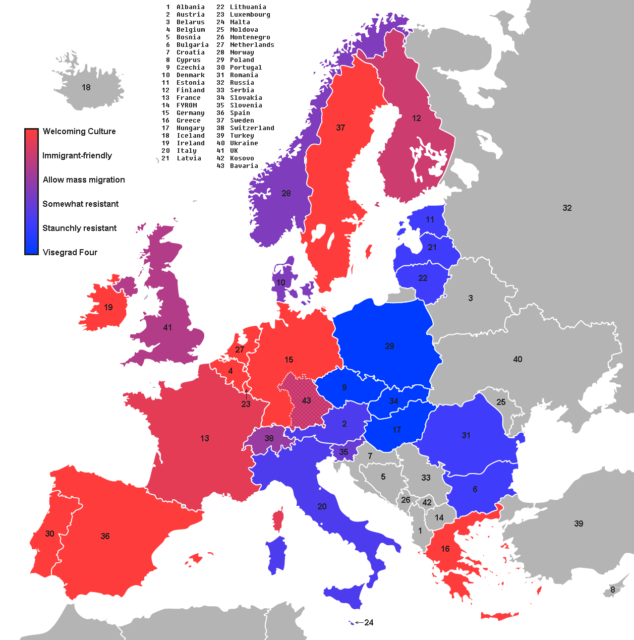The Borderers are usually called “the Scots-Irish”, but Fischer dislikes the term because they are neither Scots (as we usually think of Scots) nor Irish (as we usually think of Irish). Instead, they’re a bunch of people who lived on (both sides of) the Scottish-English border in the late 1600s.
None of this makes sense without realizing that the Scottish-English border was terrible. Every couple of years the King of England would invade Scotland or vice versa; “from the year 1040 to 1745, every English monarch but three suffered a Scottish invasion, or became an invader in his turn”. These “invasions” generally involved burning down all the border towns and killing a bunch of people there. Eventually the two sides started getting pissed with each other and would also torture-murder all of the enemy’s citizens they could get their hands on, ie any who were close enough to the border to reach before the enemy could send in their armies. As if this weren’t bad enough, outlaws quickly learned they could plunder one side of the border, then escape to the other before anyone brought them to justice, so the whole area basically became one giant cesspool of robbery and murder.
In response to these pressures, the border people militarized and stayed feudal long past the point where the rest of the island had started modernizing. Life consisted of farming the lands of whichever brutal warlord had the top hand today, followed by being called to fight for him on short notice, followed by a grisly death. The border people dealt with it as best they could, and developed a culture marked by extreme levels of clannishness, xenophobia, drunkenness, stubbornness, and violence.
By the end of the 1600s, the Scottish and English royal bloodlines had intermingled and the two countries were drifting closer and closer to Union. The English kings finally got some breathing room and noticed – holy frick, everything about the border is terrible. They decided to make the region economically productive, which meant “squeeze every cent out of the poor Borderers, in the hopes of either getting lots of money from them or else forcing them to go elsewhere and become somebody else’s problem”. Sometimes absentee landlords would just evict everyone who lived in an entire region, en masse, replacing them with people they expected to be easier to control.
Many of the Borderers fled to Ulster in Ireland, which England was working on colonizing as a Protestant bulwark against the Irish Catholics, and where the Crown welcomed violent warlike people as a useful addition to their Irish-Catholic-fighting project. But Ulster had some of the same problems as the Border, and also the Ulsterites started worrying that the Borderer cure was worse than the Irish Catholic disease. So the Borderers started getting kicked out of Ulster too, one thing led to another, and eventually 250,000 of these people ended up in America.
250,000 people is a lot of Borderers. By contrast, the great Puritan emigration wave was only 20,000 or so people; even the mighty colony of Virginia only had about 50,000 original settlers. So these people showed up on the door of the American colonies, and the American colonies collectively took one look at them and said “nope”.
Except, of course, the Quakers. The Quakers talked among themselves and decided that these people were also Children Of God, and so they should demonstrate Brotherly Love by taking them in. They tried that for a couple of years, and then they questioned their life choices and also said “nope”, and they told the Borderers that Philadelphia and the Delaware Valley were actually kind of full right now but there was lots of unoccupied land in Western Pennsylvania, and the Appalachian Mountains were very pretty at this time of year, so why didn’t they head out that way as fast as it was physically possible to go?
At the time, the Appalachians were kind of the booby prize of American colonization: hard to farm, hard to travel through, and exposed to hostile Indians. The Borderers fell in love with them. They came from a pretty marginal and unproductive territory themselves, and the Appalachians were far away from everybody and full of fun Indians to fight. Soon the Appalachian strategy became the accepted response to Borderer immigration and was taken up from Pennsylvania in the north to the Carolinas in the South (a few New Englanders hit on a similar idea and sent their own Borderers to colonize the mountains of New Hampshire).
So the Borderers all went to Appalachia and established their own little rural clans there and nothing at all went wrong except for the entire rest of American history.
Scott Alexander, “Book Review: Albion’s Seed“, Slate Star Codex, 2016-04-27.
[Y]ou can end all argument on any issue in Canada by saying a proposal is “American-style”. I’m waiting for someone to seriously argue for abolishing elections, since they lead to “American-style argument, disunity and wasteful spending on political campaigns”.




